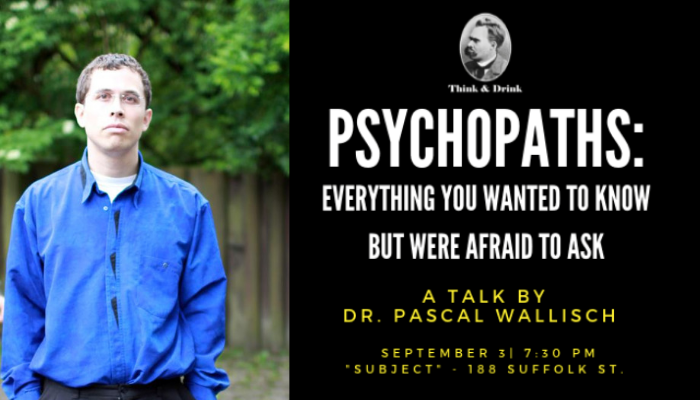Pascal Wallisch is a Clinical Assistant Professor of Psychology at NYU, where he studies psychopathy.
Ahead of his Tuesday night lecture, Psychopaths: Everything You Wanted to Know, but Were Afraid to Ask, I asked Professor Wallisch about the common traits of psychopaths, the positive aspects of psychopathy, and what he finds most fascinating about studying this frequently misunderstood disorder…
According to the Psychopathic Personality Inventory test, there are two main factors of psychopathy: fearless dominance and self-centered impulsivity. Those seem like pretty common character traits, no?
Actually, the original PPI features 8 main factors of psychopathy. The revised version combined them into the 2 super-factors you mention, because people who had some characteristics tended to have others. I like the original 8 better because it gives people a better idea what is going on, e.g. coldheartedness or fearlessness. There is indeed nothing wrong with having just one of them, in isolation. For instance, people pay a lot of money to get rid of anxieties, so someone who has this trait naturally might make a good firefighter or soldier. Another is stress-immunity, the ability to stay cool under pressure. That one is particularly prized in all kinds of professions.
The problem is a matter of degree – non-psychopaths might have one of these 8 traits, not all of them. Or in small, not in extreme doses. But the point that psychopathy is a spectrum is well taken.
What are some of the most accurate portrayals of psychopathy in films (or TV), and what did they get right?
Most of them do it wrong, mixing in psychosis or other conditions, for additional drama. In general, if they portrayed it accurately, there wouldn’t be much of a movie. Gone Girl would be over in 5 minutes, if the movie was more realistic (because of their typical carelessness). There are some positive examples, of course. Begbie in Trainspotting, for instance. Several of the characters in House of Cards are good portrayals of “successful psychopaths”.
Can a psychopath fall in love?
No. The concept won’t make any sense to them. When pressed on it, they think it means sex.
Are there any positive traits associated with psychopathy?
Under the right circumstances, psychopathy confers an extreme survival advantage to the individual. If social order were to break down, my money would be on psychopaths surviving, because they will do whatever it takes to make it. As a matter of fact, they live like that anyway, as if the social contract doesn’t apply to them. That – of course – makes the group less viable in the competition with other groups, as trust – and the ability to coordinate large groups with little friction – is lost when psychopaths are present. So, given the right circumstances, some psychopathic traits can be extremely useful. For instance, if the environment rewards extreme risk taking, psychopaths will outperform non-psychopaths, as that will come naturally to them. If the situation calls for caution, the same approach can spell disaster.
What do you find most fascinating about studying psychopathy?
Probably that they exist in the first place. Most people assume that everyone else is kind of like them. There are whole philosophies based on the assumption that we are all more or less the same inside, with the same hopes, dreams and goals. Psychopaths are fascinating because they are a stark reminder that this assumption is just not true. There are people among us who experience the world radically differently, and in moral terms no less. In other words, they know right from wrong, but they don’t care. And they are surprisingly common, if you know what you’re looking for.
Pascal Wallisch will be discussing psychopathy this Tuesday night at Subject, in the Lower East Side. Find the event details here.


